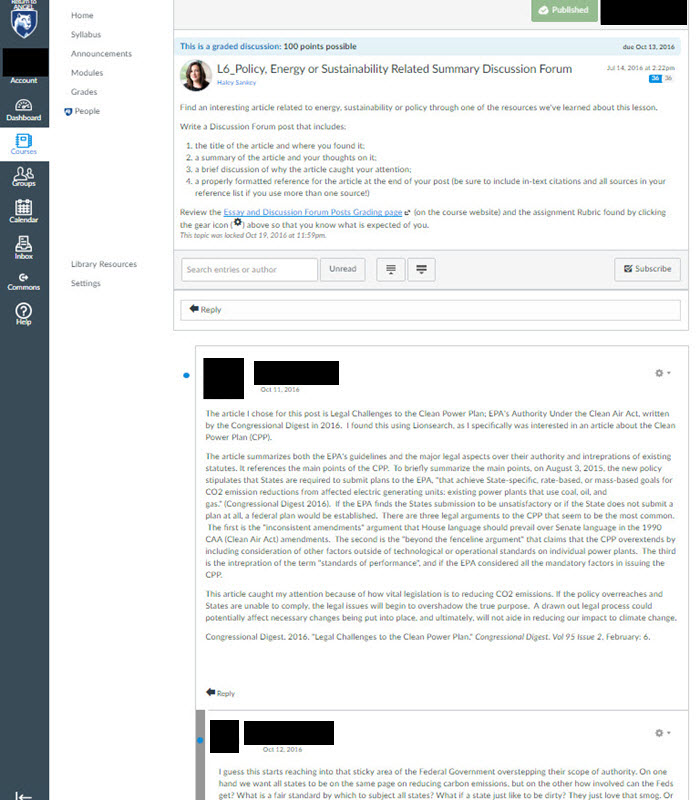Class Participation in a Virtual Classroom
For many of you, this Orientation Course is your first foray into the world of online classes, and you may find yourself asking, "What does participation have to do with anything?" The answer is - participation is important, not just for grades, but for enriching the experience you'll have in the ESP Program. You should also consider it a wonderful networking opportunity, to link up with classmates who have similar interests and career goals - and might be working for the types of employers you see yourself gravitating toward in the future! It's never too early to build bridges!
Please be sure to carefully read the Constructive Participation in ESP Peer-to-Peer Activities page to better understand what is expected of you and your classmates. This information is also included in the course syllabus.
How is Class Participation Different in an Online Course?
Good question! Obviously, we're separated by time and space in an online course in a way with which residential courses don't have to contend. But, just like anything else, doing things differently (and being creative) doesn't mean doing things inadequately; some of the most engaging student discussions that happen have occurred in online courses, not residential ones - so get ready to chime in!
It is important that you not only check your Penn State email regularly (at least 4 times/week), but that you also log on to your classes regularly (multiple times/week) in order to actively participate in discussion forums, see updates on course assignments, etc. Many discussion forum rubrics will include a frequency component, meaning that one comment for the week may not meet the assignment expectations.
Most of your courses will be asynchronous.
This means that you aren't required to 'tune in' to listen to the instructor lecture at a certain time. Instead, the courses are designed so that working professionals like yourself can work through the material in your own time at your own pace. This means that your traditional group discussions will occur as a written format more than verbally talking to one another. Remember when Instant Messenger was popular? And you had to be online and not idle to chat with someone? Now we have Facebook and can post messages on people's walls or comment on their pictures and status updates when we see them, and they can respond whenever they see our posts. Online class discussions are similar to that same sort of communicating.
Written communication works better for some people than verbal communication.
Maybe you were always the shy person in class who didn't want to raise your hand to answer a question or participate in a group discussion. Posting on discussion forums and commenting on other students' entries from a distance may provide you with a level of comfort. You might find that you're actually much more apt to chime into discussions online – that’s great! Or, maybe you're the person who was always first to speak up in class, and so you'll be the one to write your discussion forum posts or comments first and find yourself frustrated at waiting for classmates to respond. Either way, this can be an exciting new challenge as you embark on your education. You can see an example of what a discussion forum will look like at the bottom of the page.
The Internet is forever.
In some of the courses you'll take, you may be asked to post assignments to an approved blog space. Many of the topics you find yourself discussing may be controversial as they relate to climate, energy, and other environmental politics and policy. While we encourage you to be open and free with what you write, you should recognize that your postings will be out there for the world to see - so if you're going to make claims about (insert any controversial environmental topic here), you'll want to be certain to do it respectfully, grounded with facts with reputable sources, and in a way you would be proud for folks other than those in the class to see.
Input = Output.
Just like any other activity you’re involved in, you'll soon find that some people are more engaged in the material or the process than others. That's fine, but we want you to recognize that many of these courses are designed to force you to work together - across time zones and other hurdles. This isn't done to somehow make things more difficult for you - it's done to simulate the type of working environment you'll likely experience when you graduate. No one, especially those in sustainability issues of any kind, works in a solitary silo. It is in your best interest to make a genuine effort in the participation component of the courses you take in this program. It will enrich the experience you have in the course, likely improve your grade, and benefit your classmates as well.
Example of a Discussion Forum.
